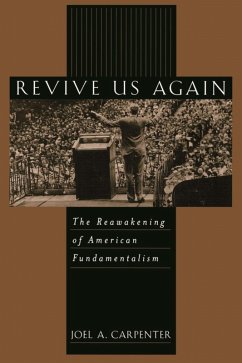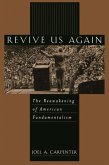By the end of the 1920s, fundamentalism in America was intellectually bankrupt and publicly disgraced. Bitterly humiliated by the famous Scopes "monkey trial," this once respected movement retreated from the public forum and seemed doomed to extinction. Yet fundamentalism not only survived, but in the 1940s it reemerged as a thriving and influential public movement. And today it is impossible to read a newspaper or watch cable TV without seeing the presence of fundamentalism in American society. In
Revive Us Again, Joel A. Carpenter illuminates this remarkable transformation, exploring the history of American fundamentalism from 1925 to 1950, the years when, to non-fundamentalists, the movement seemed invisible. Skillfully blending painstaking research, telling anecdotes, and astute analysis, Carpenter--a scholar who has spent twenty years studying American evangelicalism--brings this era into focus for the first time. He reveals that, contrary to the popular opinion of the day, fundamentalism was alive and well in America in the late 1920s, and used its isolation over the next two decades to build new strength from within. The book describes how fundamentalists developed a pervasive network of organizations outside of the church setting and quietly strengthened the movement by creating their own schools and organizations, many of which are prominent today, including Fuller Theological Seminary and the publishing and radio enterprises of the Moody Bible Institute. Fundamentalists also used youth movements and missionary work and, perhaps most significantly, exploited the burgeoning mass media industry to spread their message, especially through the powerful new medium of radio. Indeed, starting locally and growing to national broadcasts, evangelical preachers reached millions of listeners over the airwaves, in much the same way evangelists preach through television today. All this activity received no publicity outside of fundamentalist channels until Billy Graham burst on the scene in 1949. Carpenter vividly recounts how the charismatic preacher began packing stadiums with tens of thousands of listeners daily, drawing fundamentalism firmly back into the American consciousness after twenty years of public indifference. Alongside this vibrant history, Carpenter also offers many insights into fundamentalism during this period, and he describes many of the heated internal debates over issues of scholarship, separatism, and the role of women in leadership. Perhaps most important, he shows that the movement has never been stagnant or purely reactionary. It is based on an evolving ideology subject to debate, and dissension: a theology that adapts to changing times.
Revive Us Again is more than an enlightening history of fundamentalism. Through his reasoned, objective approach to a topic that is all too often reduced to caricature, Carpenter brings fresh insight into the continuing influence of the fundamentalist movement in modern America,and its role in shaping the popular evangelical movements of today.
Dieser Download kann aus rechtlichen Gründen nur mit Rechnungsadresse in A, B, BG, CY, CZ, D, DK, EW, E, FIN, F, GR, HR, H, IRL, I, LT, L, LR, M, NL, PL, P, R, S, SLO, SK ausgeliefert werden.









